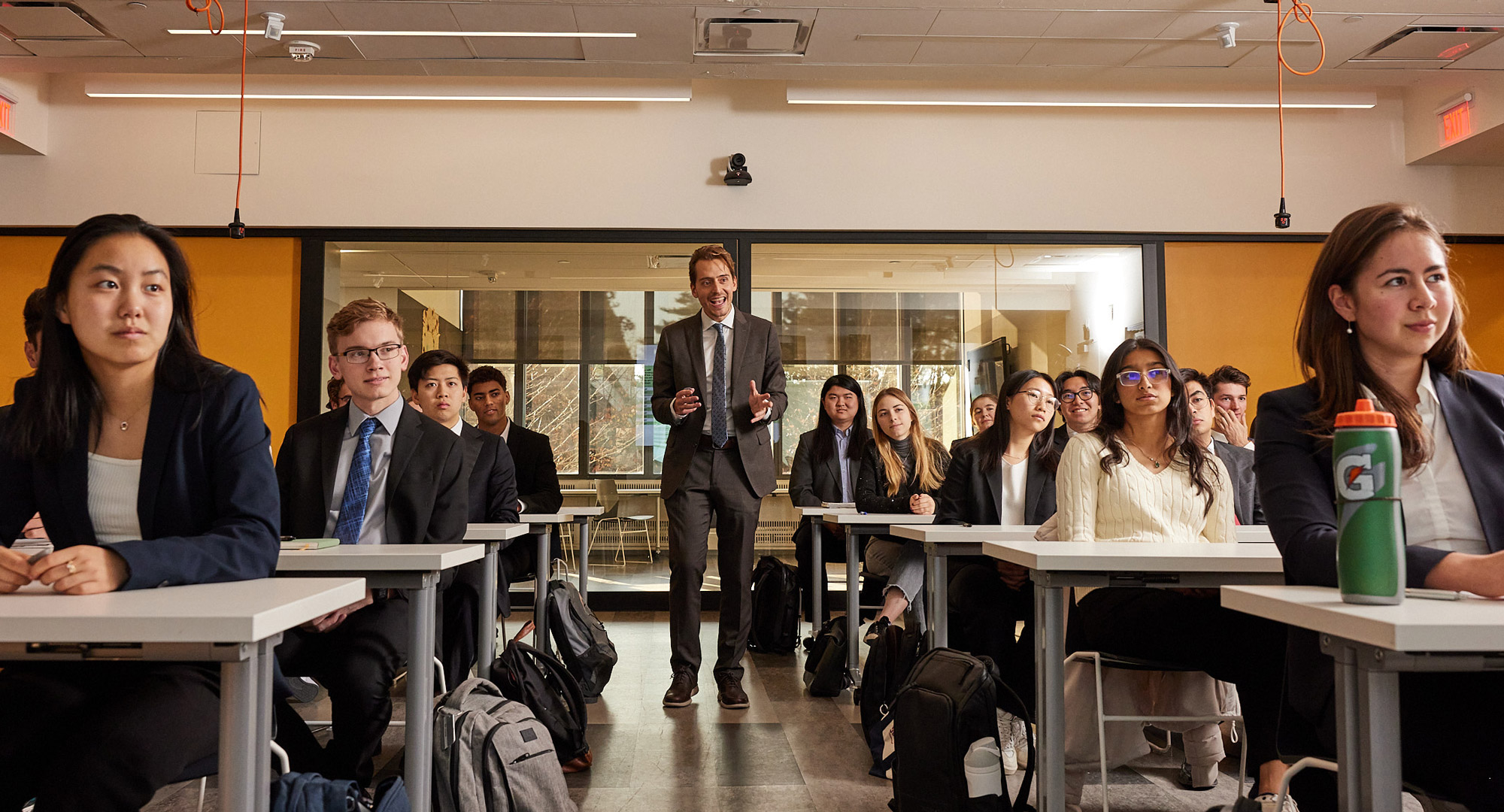
Bruno Verdini presides over 11.011 The Art and Science of Negotiation, which has become one of MIT’s most popular electives.
PHOTO: KEN RICHARDSON
TITLE
11.011 The Art and Science of Negotiation
INSTRUCTOR
Bruno Verdini SM ’13, PhD ’15
FROM THE CATALOG
Introduction to negotiation theory and practice. Applications in government, business, and nonprofit settings are examined. Combines a hands-on personal skill-building orientation with a look at pertinent tactical and strategic foundations.
Preparation insights, persuasion tools, ethical benchmarks, and institutional influences are examined as they shape our ability to analyze problems, negotiate agreements, and resolve disputes in social, organizational, and political circumstances characterized by interdependent interests.
CLASS STRUCTURE
“11.011 was probably the most valuable, impactful educational experience I’ve had at MIT,” says Nicolas Stone Perez ’25, a double major in 6-14 Computer Science, Economics, and Data Science and 15-1 Management. “It has a magical reputation on campus. And it still exceeded my wildest expectations.”
Since lecturer Bruno Verdini SM ’13, PhD ’15 began teaching the class in the Department of Urban Studies and Planning in 2016, 11.011 has become one of MIT’s most popular electives, with hundreds of students applying and a lucky few admitted by lottery. In class, they conduct live negotiations with their peers, compare tactics across debriefs, reflect through written journal entries, and prepare with readings that include political speeches, court cases, and psychological studies.
Students linger after each class for unofficial coaching with Verdini and the teaching assistants, and it’s that kind of mutual care and attention, according to Stone Perez, that makes the class so special. His experience in 11.011 led him to become one of the teaching assistants for the class and to enroll in 11.111 Leadership in Negotiation: Advanced Applications, another lottery-enrollment course Verdini created in 2018 in response to students’ desire to continue building their skills.
“The professor and teaching assistants aren’t trying to give the students a playbook for how to negotiate,” says Stone Perez. “It’s the teaching team’s goal to empower students to unlock better versions of themselves and develop their own unique negotiation playbook.”
Knowing what you stand for
Verdini received the Institute’s first-ever interdisciplinary PhD in negotiation, communication, diplomacy, and leadership in 2015. “I had fallen in love with these four fields because they ask for a full presence,” he says. “You can’t negotiate or lead effectively if you don’t know what you stand for, and you can only figure out what you stand for if you’re committed in a lifelong process of self-discovery and curiosity about oneself and each other.”
During his PhD, Verdini was mentored by Melissa Nobles, former head of the Department of Political Science and current MIT chancellor, and Lawrence Susskind MCP ’70, PhD ’73, the Ford Professor of Urban and Environmental Planning, who is widely known as one of the founders of modern mediation practices.
Verdini had planned to continue his international diplomacy work after his PhD, but was invited to teach 11.011, which was founded in the 1980s. Its current breakthrough popularity is the result of Verdini’s emphasis on tailored coaching and his multifaceted approach, sharpened through collaborations with decision-makers from over 80 countries, to the challenges of our times—and, as he puts it, the trust he places in MIT students to thrive when they are given the responsibility to put an equal focus on ethics and spirituality as on strategy and influence.
“I began my PhD thinking I would continue with international diplomacy work. And I do that, just not on behalf of any specific nation, but instead on behalf of a set of universal skills and virtues,” he says. “I’ve found that when you lead a pedagogical mission, you are in the ultimate ambassador role, partnering with stakeholders to spark ways to unearth what they come to see as the very best of themselves.”
The world you want to build
Moeen Razzaque, a Harvard student majoring in electrical engineering who has cross-registered in many MIT classes, wasn’t sure what to expect in 11.011.
“When I first encountered negotiation, I thought of what happens in hostage situations or a marketplace,” he says. “But I’ve come to understand that negotiation is everywhere, since it’s all about how we create the most value out of our differences.
As I navigate the next chapter of my life, I’m trying to be conscientious and take classes that help me understand what kind of world I want to build solutions for—11.011 is the culmination of that.”
Maya Makarovsky ’25, a 6-14 and 15-2 Business Analytics double-major, traveled to Ghana as part of an MIT project after taking 11.011 and immediately saw how the course had “altered [her] brain chemistry” for the better. One example: in the midst of passionate, defensive arguments in a business meeting, she was able to steer the discussion back to a more productive place.
“Before speaking, I took a moment to think of how to create value through our different interpretations of reality, and how we could convert an adversarial critical stance to one of mutual respect to work towards progress,” she says. “11.011 empowered me to step back in the heated situation and think about what I should prioritize for all stakeholders involved, which was the long-term success of the project rather than short-term ego defense.”
That consideration extends to those who do not have a seat at the negotiating table. “Even though you have your own ambitions and values, you want to genuinely consider others affected by the negotiation as well,” says Stone Perez.
“Whether you’re launching your startup, joining a new company, or deciding to run for public office—or even just in your personal relationships—you must have moral clarity about how to manifest your voice.” A member of the MIT varsity soccer team, Stone Perez sees parallels on the pitch, too: every pass to a teammate is a negotiation “because you’re looking for connection, thinking ahead, trying to get them to go somewhere new—somewhere that will produce a better outcome for them and the team as whole.”